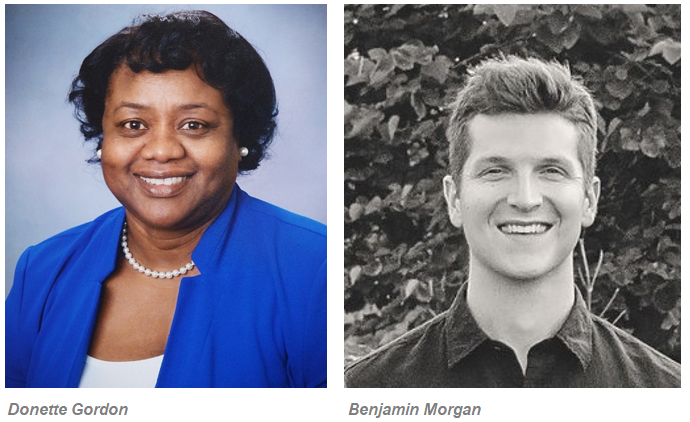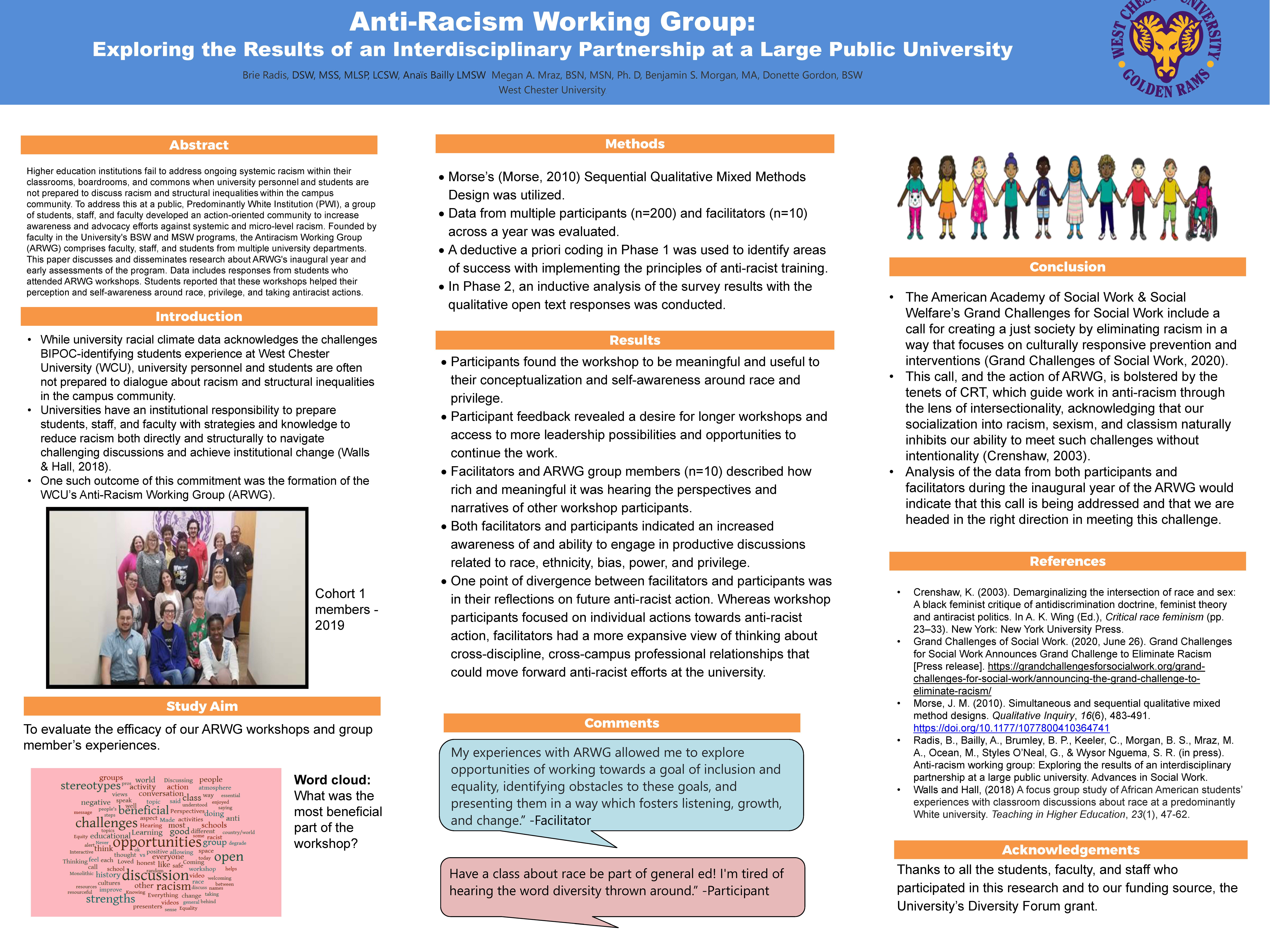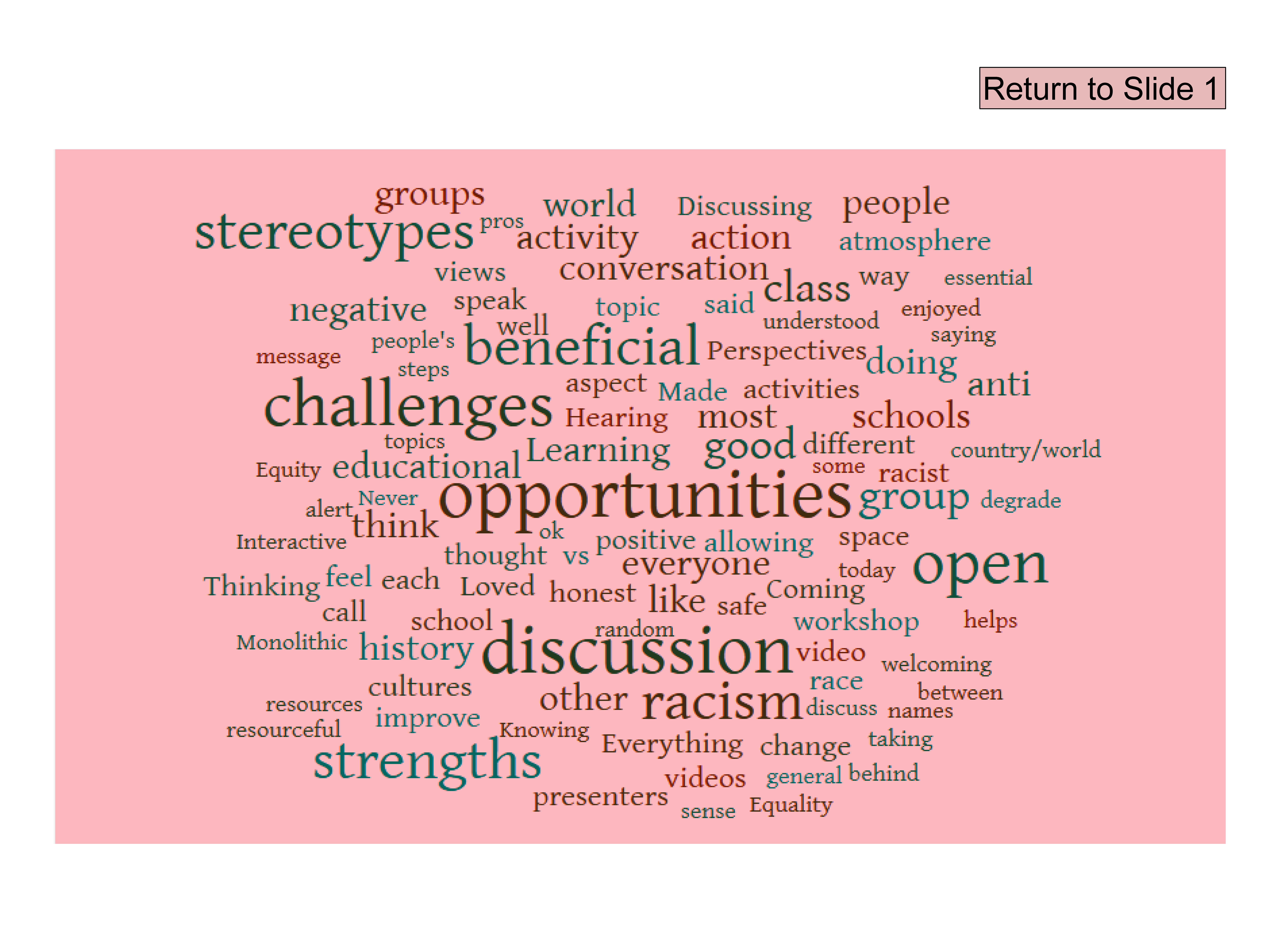Anti-Racism Working Group: Exploring the Results of an Interdisciplinary Partnership at a Large Public University
Brie Radis, West Chester University, West Chester, PA (USA)
Donette Gordon, West Chester University, West Chester, PA (USA)
Anaïs Bailly-Mompoint, West Chester University, West Chester, PA (USA)
Meg Mraz, West Chester University, West Chester, PA (USA)
Ben Morgan, West Chester University, West Chester, PA (USA)
A group of students, staff and faculty developed an action-oriented community to increase awareness and advocacy efforts against systemic and micro-level racism. Founded by BSW/MSW faculty, the Anti-Racism Working Group (ARWG) goals are to include education and awareness, and dialogue about race, ethnicity, bias, power, and privilege; cultivate interdisciplinary faculty and student relationships, and inspire anti-racist actions. This presentation discusses and disseminates research about ARWG and early assessments of the program.
View Recording of Poster Presentation
View PDF of Poster.
View Recording of Poster Presentation by Donette Gordon and Benjamin Morgan

- Abramovitz, M., & Blitz, L. V. (2015). Moving toward racial equity: The Undoing Racism Workshop and organizational change. Race and Social Problems, 7(2), 97. https://doi.org/10.1007/s12552-015-9147-4
- Ajunwa, I (2020, September 5). 10 Reasons why anti-racism training is not the problem. Forbes. https://www.forbes.com/sites/ifeomaajunwa/2020/09/05/10-reasons-why-anti-racism-training-is-not-the-problem/?sh=2b35959b6298
- Alejano-Steele, A., Hamington, M., MacDonald, L., Potter, M., Schafer, S., Sgoutas, A., & Tull, T. (2011). From difficult dialogues to critical conversations: Intersectionality in our teaching and professional lives. New Directions for Teaching and Learning, 125(2011), 91-100. https://doi.org/10.1002/tl.436
- Alimo, C. J. (2012). From dialogue to action: The impact of cross-race intergroup dialogue on the development of white college students as racial allies. Equity & Excellence in Education, 45(1), 36-59. https://doi.org/10.1080/10665684.2012.643182
- Berman, G., & Paradies, Y. (2010). Racism, disadvantage and multiculturalism: towards effective anti-racist praxis. Ethnic and Racial Studies, 33(2), 214-232. https://doi.org/10.1080/01419870802302272
- Bezrukova, K., Spell, C. S., Perry, J. L., & Jehn, K. A. (2016). A meta-analytical integration of over 40 years of research on diversity training evaluation. Psychological Bulletin, 142(11), 1227. https://doi.org/10.1037/bul0000067
- Centers for Disease Control and Prevention. (2020, July 24). Health equity considerations and racial and ethnic minority groups. https://www.cdc.gov/coronavirus/2019-ncov/community/health-equity/race-ethnicity.html
- Charon, R. (2017). Narrative in Social Work Practice: The Power and Possibility of Story. Columbia University Press.
- Cohen, M., & Hyde, C. (2014). Empowering workers and clients for organizational change. Lyceum.
- Corley, N. A., & Young, S. M. (2018). Is social work still racist? A content analysis of recent literature. Social Work, 63(4), 317–326. https://doi.org/10.1093/sw/swy042
- Corneau, S., & Stergiopoulos, V. (2012). More than being against it: Anti-racism and anti oppression in mental health services. Transcultural Psychiatry, 49(2), 261-282. https://doi.org/10.1177/1363461512441594
- Crenshaw, K., Gotanda, N., Peller, G., & Thomas, K. (Eds.). (1995). Critical race theory. New York: New York University Press.
- Crenshaw, K. (2003). Demarginalizing the intersection of race and sex: A black feminist critique of antidiscrimination doctrine, feminist theory and antiracist politics. In A. K. Wing (Ed.), Critical race feminism (pp. 23–33). New York: New York University Press.
- Creswell, J. W., & Clark, V. L. P. (2017). Designing and conducting mixed methods research. Sage.
- Dominelli, L. (2017). Anti-racist social work. Macmillan International Higher Education.
- Fiore, S., Metcalf, D., & McDaniel, R. (2007). Theoretical foundations of experiential learning. In M.L. Silberman (Ed.), The handbook of experiential learning (pp. 33-58). John Wiley and Sons.
- Forde, D. (2008, February 28). [UNIVERSITY] formally apologizes for past discrimination. Diverse: Issues in Higher Education. https://diverseeducation.com/article/10754/
- Foucault, M., & Gordon, C. (1980). Power/knowledge: selected interviews and other writings, 1972-1977. Pantheon Books.
- Friedersdorf, C. (2020, August 20). Anti-racist arguments are tearing people apart. The Atlantic. https://www.theatlantic.com/ideas/archive/2020/08/meta-arguments-about-anti-racism/615424/
- Gillborn, D. (2006). Critical race theory and education: Racism and anti-racism in educational theory and praxis. Discourse: Studies in the Cultural Politics of Education, 27(1), 11-32. https://doi.org/10.1080/01596300500510229
- Glaser, B., & Strauss, A. (1967). The discovery of grounded theory: Strategies for qualitative research. Sociology Press.
- Grand Challenges of Social Work. (2020, June 26). Grand Challenges for Social Work Announces Grand Challenge to Eliminate Racism [Press release]. https://grandchallengesforsocialwork.org/grand-challenges-for-social-work/announcing-the-grand-challenge-to-eliminate-racism/
- Groenwald, S. L. (2018). The challenges and opportunities in leading a multi-campus university. Journal of Professional Nursing, 34(2), 134-141. https://doi.org/10.1016/j.profnurs.2017.12.005
- Hacker, J. S., & Pierson, P. (2020). Let them eat tweets: How the right rules in an age of extreme inequality. Liveright Publishing.
- Hamilton-Mason, J., & Schneider, S. (2018). Antiracism expanding social work education: A qualitative analysis of the Undoing Racism Workshop experience. Journal of Social Work Education, 54(2), 337–348. https://doi.org/10.1080/10437797.2017.1404518
- Harper, S. R., Smith, E. J., & Davis III, C. H. (2018). A critical race case analysis of Black undergraduate student success at an urban university. Urban Education, 53(1), 3-25. https://doi.org/10.1177/0042085916668956
- Husband, C. (1995). The morally active practitioner and the ethics of anti-racist social work. In R. Hugman & D. Smith (Eds.), Ethical issues in social work (1st ed., pp. 84-103). Routledge.


